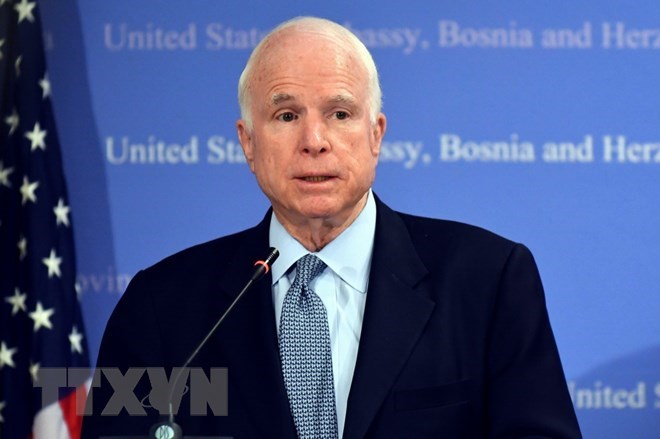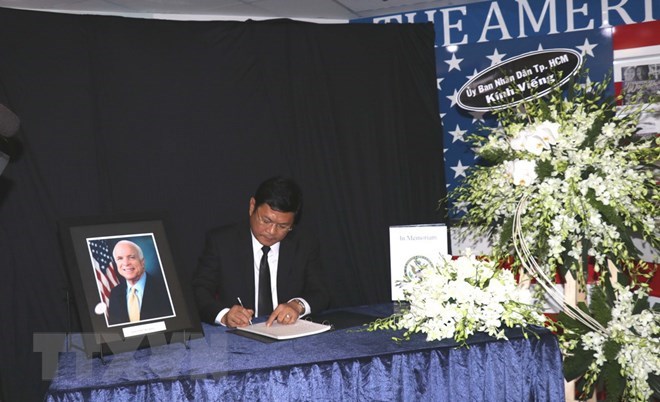More than 200 organisation representatives and individuals came to the US Embassy in Hanoi to extend their sympathies over the passing of US Senator John McCain from August 27-29, according to the embassy.

US Senator John McCain.
Among those were Deputy Prime Minister and Foreign Minister Pham Binh Minh, Chairman of the National Assembly’s Committee for External Affairs Nguyen Van Giau, and representatives from the Party Central Committee’s Commission for External Relations, several ministries, agencies, organisations and the Vietnam-US Society. They wrote in the condolence book in memory of the deceased.
Representatives from many embassies of foreign countries and international organisations in Hanoi and Vietnamese alumni in the US also paid tribute to McCain, who made great contributions to healing the wounds of the war, normalising Vietnam-US relations, and fostering the comprehensive partnership between the two nations.
Senator John McCain passed away on August 25 (US time) at the age of 81.
He himself served in the invading war of the US in Vietnam. He joined in the Rolling Thunder air campaign in 1967, bombing targets in the Democratic Republic of Vietnam (northern Vietnam). His plane was shot down on October 26, 1967 and McCain was taken prisoner. He was returned to the US in an exchange of prisoners in 1973.
Returning from Vietnam, McCain joined politics and was one of the first persons campaigning for normalisation of US-Vietnam relations through promoting humanitarian issues such as removing unexploded ordnance left by the war, searching for missing-in-action personnel, supporting people with disabilities caused by the war, and detoxifying areas polluted by dioxin.
In 1994, the US Senate approved a resolution sponsored by McCain and Senator John Kerry, calling to end the economic sanction against Vietnam, paving the way for the normalisation of relations between the two countries one year later.
Following the normalisation of bilateral ties, McCain and Kerry visited Vietnam many times to address the issue of American missing-in-action soldiers (POW/MIA).
Along with pushing for the normalisation of relations with Vietnam, Senator McCain also supported the Vietnamese community in the US, serving as a bridge between them and the US authorities as well as the Vietnamese Government.
HCM City leader pays tribute to US Senator

Vice Chairman of the Ho Chi Minh City People’s Committee Huynh Cach Mang
Vice Chairman of the Ho Chi Minh City People’s Committee Huynh Cach Mang on August 29 visited the US Centre in the city to pay tribute to US Senator John Sidney McCain III and write in the funeral book in memory of the deceased.
In his writing, Mang expressed his appreciation for McCain’s contributions to fostering Vietnam-US ties over the past decades.
US Consul General in Ho Chi Minh City Mary Tarnowka said the US has decided to provide scholarships named after the late Senator for Vietnamese individuals dedicated to activities for social betterment, in an effort to honour McCain and maintain his legacy in the Vietnam-US ties.
McCain was one of the first to campaign for the normalisation of US-Vietnam relations by promoting humanitarian issues, such as removing unexploded ordnances left by the war, searching for American missing-in-action (MIA) personnel, supporting people with disabilities that were caused by the war, and detoxifying areas polluted by Agent Orange the US forces used during the war.
In 1994, the US Senate approved a resolution sponsored by McCain and Senator John Kerry, calling to end the economic sanction against Vietnam, paving the way for the normalisation of relations between the two countries one year later.
Following the normalisation of bilateral ties, McCain and Kerry visited Vietnam many times to address the issue of MIA.
Along with pushing for the normalisation of relations with Vietnam, Senator McCain also supported the Vietnamese community in the US, serving as a bridge between them, US authorities, and the Vietnamese Government.
VNA